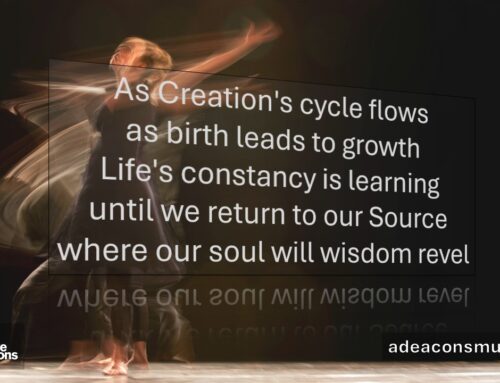Another Lenten season has arrived and my Outlook Calendar All Day Event Section
starts to look like this:
1/40, 2/40, 3/40 … 40/40 with Sundays off of course!
Spiritual Practices and Disciplines have been, relatively recently, reintroduced to many Protestants. There are many reasons that are nuanced throughout Christian history why this is and the explanations are shaded grey throughout the human story. It’s fair to say the Reformation’s turning away from these Catholic practices has softened enough that there seems to be some space to recognise, perhaps, that some of what was left behind can be helpful as men and women endeavour to be Christ’s Disciples.
There are two particular catalysts for this particular blog. The first was last week’s blog – A Deacon’s Musing: Cure or Heal? This Saturday, Barrier-Free MB arrives to begin a conversation with faith communities in our context about accessibility and, implicitly, challenge us as to how inclusive we actually are. The second influence has been J. Kameron Carter’s blog, On Eating Chocolate for Lent. Carter’s blog reminded me of where Shelly and I were last Saturday. Last Saturday we sat with 14 young women and explored the power of the media to both debase and minimise a girl->teen->young woman->adult’s agency to the point a female in our culture is simply equated with her sexuality, ability to bear children and shake her booty (See: A Deacon’s Musing: Miss Representation).
How does this connect with Lent & the Fast? The Fast itself has a long and rich history both specifically to the Christian experience and more broadly within the faiths of Abraham, and amongst other inter-faith friends. For Christians, the number 40 has a rich import and it is this time that we approach Easter. Sundays are not counted, as they are considered ‘mini-Easter’ celebration. In general, Lent’s history is less of a blog and more of a historical treatise, so maybe I’ll try to share some of how I see this links for me – and, hopefully, the connexion can be made!
Likely there are as many reasons to fast, as there people who do so. It is a Spiritual Practice with a deep history and for me, this year in particular, it feels deeply connected with examining my privilege. Let me try to share how this works …
Fasting, from sun-up to sun-down, which includes liquids during the day deeply reminds me of my body. Whenever my stomach grumbles, whenever someone looks at me with questioning, whenever someone expresses discomfort about my not eating during times when food is shared, I am reminded that I am not my body, but I am of body. And here are a few of the realities that become clear as I walk into Lent:
The funny thing about social analysis is that once you begin, you really cannot stop. In my family, we have romanticised/mythologised this quip: “Ruined for Life.” What this means is that once you start seeing the way things are – i.e. the Privilege Tree above, you cannot close your eyes. Once it starts, it’s both a gift and, at times a weight, to see beyond the veil and illusions we have collectively created and that surround us …
As I am only a few short days into the fast, I thought I would share one thing that has become clear me to me as I have reengaged with this annual Spiritual Discipline:
What that means, for me and connected with Carter’s and Miss Representation’s challenges, is that this patriarchal nature continues to this day, no matter what we would like to convince ourselves otherwise. The church has, historically, been often centred on establishing and maintaining power. And this unfortunate reality is not why I am here … and neither do I think that is in ANYWAY what Jesus intended as he shared the Good News!
Of course any revelation, which arises owing to a disciplined exercise, requires action. Opportunities such as Miss Representation screenings, sharing space with groups like Barrier-Free MB, allow for faith communities to question where they have been and where they might go once eyes have been opened. In Christian language, awakening and transformation often give rise to revelation and, in turn, the challenge to share what we have learned is both the difficult and faithful work to which we are called! A question, therefore, is what next … ?








Your reflections are most welcome!